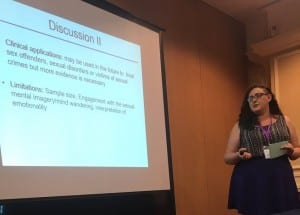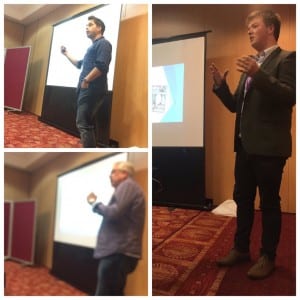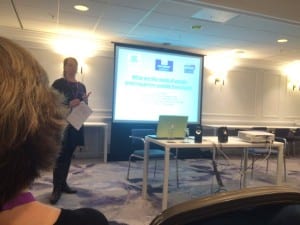by rbartels | Jul 15, 2016 | Publications
Good cheer!!! Dr Amanda Roberts (of the the FCRG) has just had two papers accepted for publication
The first reports the results of six focus-groups conducted with 40 gamblers to uncover the aspects of Electronic Gaming Machines (EGMs) that they found most attractive. Results revealed that two broad groups of characteristics emerged from the data; one linked to winning and the other with betting. For more info, follow the link below.
Landon, J., du Preez, K. P., Page, A., Bellringer, M., Roberts, A., & Abbott, M. (2016). Electronic Gaming Machine Characteristics: It’s the Little Things That Count. International Journal of Mental Health and Addiction, 1-15. DOI: 10.1007/s11469-016-9666-2
The second reports the results of a study examining gambling and violence in a sample of 3025 adults males from the UK. It was found that, after adjusting for alcohol and drug dependence, comorbid mental disorder and impulsivity, problem gambling was shown to be predictive of various measures of violent behaviour. For more, follow the link below.
Roberts, A.D. L., Coid, J., King, R., Murphy, R., Turner, J., Bowden-Jones, H & Landon, J (2016). Gambling and violence in a nationally representative sample of UK men. Addiction. DOI: 10.1111/add.13522.

by rbartels | Jul 12, 2016 | Funding Success
We are very pleased to announce that PhD student and FCRG member – Charlotte Wesson – has been awarded the Student Grant Award from the National Organisation for the Treatment of Abusers.
Charlotte has received a small research grant to aid her research that involves developing a new indirect measure to assess sexual interest – both typical and atypical – in offender and non-offender populations. Charlotte is aiming for this new measure to be used as a clinical tool (e.g., for use in forensic settings) as well as a research tool to help gain deeper insights into human sexuality.
Well done Charlotte! We wish you all the best with the research!
by rbartels | Jul 2, 2016 | Publications
A new study has just been published in Sexual Abuse: A Journal of Research & Treatment by FCRG members Craig Harper and Dr Ross Bartels, entitled “Implicit Theories and Offender Representativeness in Judgments About Sexual Crime“.
Using a sample of 252 community participants, the paper examines the interacting effect of implicit theories about sexual offenders and offender type (i.e., adult male; adult female; or male juvenile) on judgements of moral character and sentencing. The results showed that people with an entity implicit theory about sexual offenders (i.e., believing they cannot change) held more negative attitudes towards sexual offenders than did those with incremental implicit theories (believing sex offenders change).
Moreover, compared with those with an incremental implicit theory of sexual offenders, entity theorists judged sexual offending to be: (a) more indicative of the perpetrator’s moral character; and (b) more deserving of punishment. However, these scores were greater in relation to the adult male offender than the adult female and juvenile offender. Finally, a greater number of participants with an entity implicit theory provided dispositional explanations for the perpetrator’s offending behaviour than did the incrementalists, who provided more situational explanations.
The study indicates that implicit theories about sexual offenders affect judgements about sexual offenders, although for entitists, this is moderated by whether the case they are judging is representative of a stereotypical sexual offender.
For more information, please contact with Craig Harper at craigaharper19@gmail.com or Dr Ross Bartels at rbartels@lincoln.ac.uk
by rbartels | Jul 2, 2016 | Conferences / Events
Recently, on the 14-16th June, FCRG members Todd Hogue, Ross Bartels, Lauren Mumby, and Craig Harper, along with ex-MSc student Chloe Slater, current MSc student (Ryan Hesp), and two finishing undergraduate students (Bethany Browne and Jessica Mabbott) all attended and presented at the BPS’ Division of Forensic Psychology conference in Brighton.
On the first day, Ross and Chloe (and colleague Dr Geraldine Akerman from HMP Grendon) presented in a symposium entitled “Future Directions in the Treatment of Sexual Fantasies” organised by Ross and chaired by keynote speaker Prof. Tony Beech. Ross discussed his Dual-Process Model of Sexual Thinking and how it can inform treatment of sexual offenders’ sexual fantasies, while Chloe discussed the results of her MSc research (see image below left), showing that an eye-movement task holds promise as a treatment strategy for sexual fantasies. Geraldine discussed the development & efficacy of her Fantasy Modification Programme. Later during the poster session, Ryan Hesp presented his results on his Voyeuristic Behaviour Proclivity Scale (see image below right).


On the second day, Todd (with Bethany and Jessica), Craig, and Ross presented in a symposium entitled “Understanding Punitive Attitudes and Judgements about Sexual Offenders” organised and chaired by Craig (see image). First, Ross discussed the results of a new study on implicit theories and judgements of sexual crime (see here for an FCRG post on this paper). Bethany and Jessica, along with Todd, presented research using the CAPP to examine stigma towards different offender types. Craig reported results from a study currently under review showing how a humanising narrative-based intervention can reduce negative implicit and explicit evaluations of paedophiles. Later in the day, Lauren gave a talk on the needs of people entering prison custody from court (see image right).


The conference overall was an excellent event – with great keynotes, symposia, and posters.
by rbartels | Jun 9, 2016 | Conferences / Events
Yesterday (08/06/16), four members of the FCRG (Dr Ross Bartels, Charlotte Wesson, Prof Todd Hogue, and Craig Harper) spoke at the 2016 HMP Whatton conference. The conference was held in the prison grounds and saw a full-house of professionals (from various backgrounds) attend, making for a buzzing and interactive atmosphere. A number of speakers (including researchers, clinicians, and those who engage in both research and practice) presented talks on various topics pertinent to the understanding and assessment/treatment of sexual offenders.
Dr Ross Bartels and Charlotte Wesson talked about “Measuring Sexual Interest” – providing an overview of the strengths and limitations of existing methods, before introducing and presenting data on some newer indirect measures that they currently testing. These included: the Go/No-Go Association Task; Mousetracking; and an avoid-approach task administered via tablet technology.
Prof Todd Hogue and Craig Harper discussed research on attitudes towards sexual offenders, highlighting how they may impact on professional practice; an the important issue that has received little attention. Craig presented data showing that, when under cognitive load, people tend to rely on sexual offender stereotypes/schemas when forming judgements about a sexual offence case.
The conference also included: Lawrence Jones (Rampton Hospital) who discussed some fascinating ideas about trauma and sexual offending; Dr Steven Gillespie (Newcastle University) who talked about female who have sexually offended, offering new empirical results; Lynsey Regan (HMP Whatton) who highlighted important factors that must be taken into account when working with autistic sexual offenders; and Prof. Belinda Winder and Dr Lucy Betts (Nottingham Trent University) who discussed childhood bullying and sexual offending.
The conference was a very enjoyable event, providing excellent opportunities for networking and very interesting presentations. The lunch spread was also delicious!!





